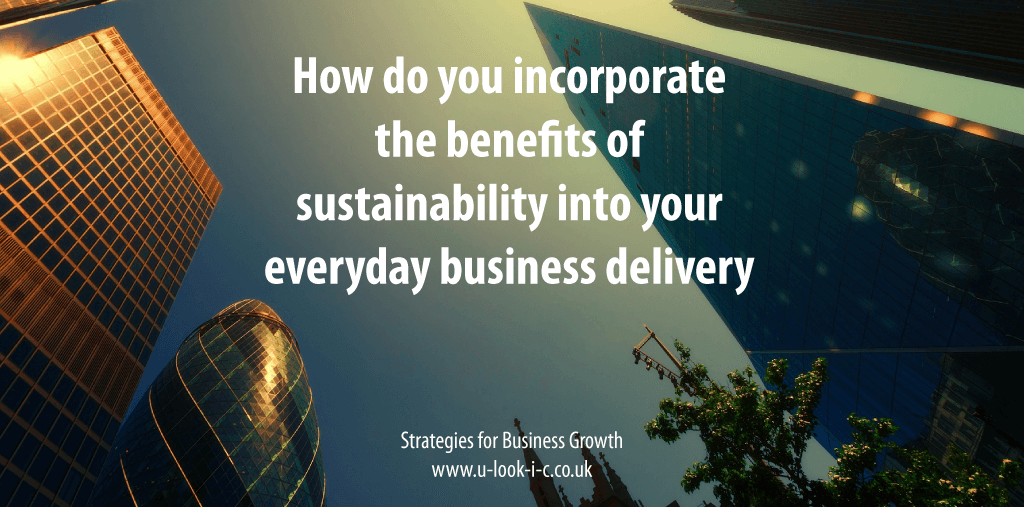Sustainability – there’s a subject; one we all face every day affecting every decision we make to deliver our own business plan while taking into account the future of our planet and environment. We all know it’s not a ‘choice’ but an obligation with hefty consequences if not adhered to.
So, when it comes to individual businesses, how do you make those required changes without costing the earth? We’ve been actively involved in sustainable practices for a number of business categories for over 30 years; we do have a view that remains as relevant now as it has always been, but there are always updates, changes, developments and ‘hot topics’ that affect the decisions made to remain in control of the desired outcome.
We all understand the implications of doing nothing or do we?
We’re often surprised to hear comments like ‘we cannot afford it’ and ‘what are the benefits?’
With those questions in mind, let’s outline our approach which may be relevant to some:
- Sustainability is not a fad; it is a business and social imperative which everyone is affected by both in work and personally.
- Sustainability is best applied to structured activity – without clear process, costs are hard to turn into investment. Sustainability has long reaching benefits if built into your plan at the outset; cascading throughout the business over all areas.
- Sustainable practices should generate investable options that improve efficiency – they must be part of your effectiveness approach. Part of the skill is to identify opportunities to build into your operational plan for consistent sustainable delivery, no matter your business category
- Without going into specific sectors of business categories; many types of Contract Awards have elements of sustainable requirements / practices embedded into them as part of the criteria; your business needs to meet these to be awarded the contract in the first place - therefore embracing sustainable approaches increases opportunity and longer term business security if your business meets these specific and long reaching criteria [ask us for specific details aligned to your business]
- Having the knowledge and the skills to deliver sustainability must be part of the business structure - The recruitment of knowledgeable and highly motivated people is the easiest way to achieve the outcome maintaining the expertise in-house. If your business is not successful in attracting and retaining the best people to achieve the required outcomes, then ability to compete in your market place diminishes rapidly.

To expand on the understanding sustainable practices; many business have taken the ESG route to mean energy saving practices, which of course to be truly sustainable it is much broader than that. Many businesses have undertaken or have been provided with audits on elements normally with a high emphasis on Energy and its usage reduction.
However, this is often divided into the three defined scopes. These are basically as follows:
Scope 1: Direct emissions from an organization's owned operations, including company-owned vehicles and buildings.
Scope 2: Indirect emissions from purchased electricity, steam, heating, and cooling.
Scope 3: All other indirect emissions generated throughout an organization’s value chain, including business travel, investments, end-of-life treatment of sold products, and purchased goods and services (among others).
These scopes do assist in appreciating your current position, particularly in times of high energy costs. However, we would suggest that in future there will be greater emphasis on scope 3 as this will deliver a more sustainable approach with associated benefits
The implications are far reaching and it is understandably daunting for many. We strongly suggest Scope 3 is where greatest opportunity to make meaningful change is encapsulated.
The key point is not to concentrate on one element of sustainability it has to be a holistic delivery.
In terms of technical explanations the term ESG policy and circular economy are widely used but are often seen as negatives rather than a business need with a real set of benefits attaching.
To assist further with ESG these are the classic definitions for reference:
- ESG – ‘Environmental, Social, and Governance’ is a framework used to understand and measure how sustainably an organization operates.
- The circular economy is a system where materials never become waste and nature is regenerated. In a circular economy, products and materials are kept in circulation through processes like maintenance, reuse, refurbishment, remanufacture, recycling, and composting. The circular economy tackles climate change and other global challenges, like biodiversity loss, waste, and pollution, by decoupling economic activity from the consumption of finite resources
So how and where do we start?
- A thorough review of your business will help to identify areas to address / update or change to achieve your overall business objectives / goals- see scope 3
- A good place to start is to consider sustainable practices as a ‘value – add’ approach to your business - make this your mission and business culture
- Everyone needs to be on board to deliver your plan. Create a delivery team – that has teeth. Those involved need to have the ability to make it happen and all need to be on board with the concept
- Ensure your mission statement represents your total approach and is very clearly explainable to your team, your suppliers and your customers. In effect it is your culture.
- Look at every element of cost and ask three basic questions:
- Why does it exist?
- Can we do things differently and if possible utilise your team, suppliers to look at turning cost into an investable benefit.
- Can our offer to our clients have a changed emphasis? They should also incorporate the collective benefits into a more enhanced and sustainable offer – particularly relevant if B2B.
- Change can feel like a scary place – however, without it any business cannot move forward or compete in the areas they need to; remaining a viable business choice to deliver - Embrace the change in all that you do. Many companies have sustainable initiatives that have benefits to nonaligned businesses as such the ability to reach new markets is heightened. This is often delivered through academic support and specialised agents. Often grant support is available. Grants /investments are becoming available to assist in long term approaches they are not short term cash injections.
So how do we help?
We help you to identify your options and create a way forward. We are specialists and have a track record of delivery.
We help to change perceptions by assisting with improved working methods. We work to ‘align functions’ and increase your business ability and profitability.
Most of all we are Independent Growth Consultants, on your side!
We work directly with businesses, hands-on or as a senior advisor. We are your independent partner. Starting effectively, ensures you are in control and are poised to make the best of whatever comes your way - adverse or positive.
Contact us for a no obligation chat or to find out more give us a call







